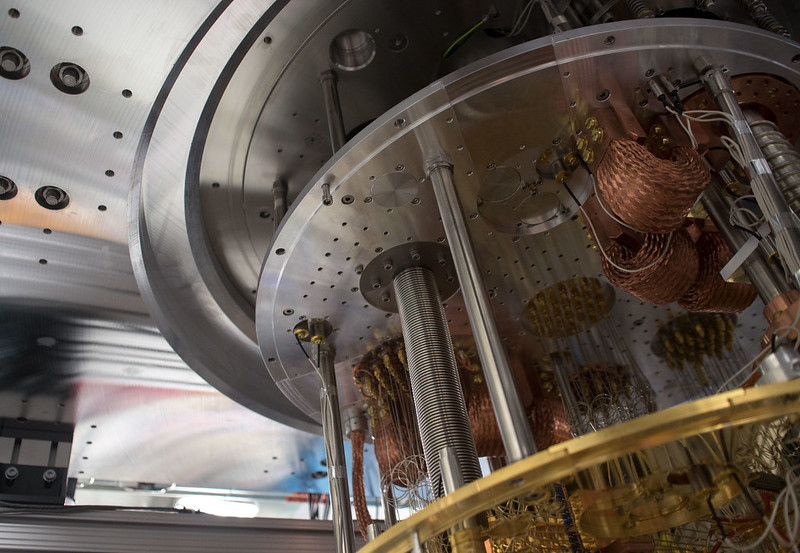Quantum computing is no longer a futuristic science fiction concept. In the next decade, quantum computing will be advanced enough to rapidly solve complex computational problems like profiling financial risk, developing new biological and chemical products, and solving algebraic equations that would take current supercomputers decades to work through. As this technology rapidly improves and develops, users may not be aware of its full potential and the risks it can pose to personal and national security. Those who are unaware of this major technological innovation and its power to change society, perhaps irrevocably, will not be in a position to decide whether to lobby their political representatives to regulate it. If there is no public discussion about this technology’s good, bad, and ugly uses, industry’s needs and investors’ wants alone will be left to guide its development and applications.
At this point, one may ask what quantum computing is. It is a type of advanced computing whereby principles of quantum physics are harnessed to solve complex problems. These new computers are designed to complement and act as an extension of classical computers. Instead of using optical or electrical pulses and binary coding to generate digital content like a classical computer, quantum computers can run multidimensional quantum algorithms by using subatomic particles like photons and electrons to harness their superior processing power. This allows them to simulate natural processes, graph complex problems, and solve algebraic equations faster and better than any current technology. IBM uses a metaphor to describe the difference between the two systems, saying “flipp[ing] a coin…[is] either up or down,” whereas spinning a coin allows for exponential increase in possibilities.
The idea of quantum computing is not new, but its practical use is a recent breakthrough. Quantum information theory was a product of the 1980s, and the mathematical and algorithmic blueprint for quantum computing was created as early as the 1990s. In the 2000s, scientists figured out how to physically create the subatomic particles that quantum computers rely on, and quantum computing systems were made viable in the 2010s. The 2020s mark the tipping point of quantum computing technology, as these computers can now be used to solve problems and be accessed by businesses and individuals via cloud computing technology. By 2030, the global market for quantum computing is predicted to be worth up to $50 billion.
The upside of quantum computers is that they will soon be able to find answers to questions posed by engineers and scientists that had previously been impossible for supercomputers to solve. These questions include how to best mitigate issues related to world hunger, climate change, and future pandemics. In addition, quantum computers provide society with a new tool to speed up and supplement the scientific method, changing how we can learn new things about our world and others. Their applications will span from profiling risk and optimizing trade for businesses in the financial sector to discovering genome-based medical therapies and optimizing route planning for air and maritime transportation. Some have suggested that the advent of quantum computers in the 21st century will transform the world like that of the automobile in the 20th century.
The downside of the creation of this remarkably transformative and powerful technology is that quantum computers will be able to solve cryptographic puzzles found in the current cybersecurity infrastructure. In the wrong hands, quantum computers would allow individuals, corporations, or states to easily hack into national security infrastructure, banking systems, utility grids, healthcare systems, and personal data, rendering existing encryption systems obsolete. Many organizations and companies’ cybersecurity is already relatively vulnerable to modern attacks, let alone ones originating from quantum computers. Currently, quantum computers are not yet able to hack these systems. However, experts like Hoi-Kwong Lo from the Centre of Quantum Information and Quantum Control at the University of Toronto believe that quantum computers will be able to do so in just five years. The US government released a statement in May acknowledging these risks and announcing the commencement of an American program aimed to create quantum-resistant encryption for their vulnerable data.
The most worrisome side of quantum computing is how militaries can and will utilize it as part of the new quantum “arms” race. Quantum technologies can shift the balance of world military power. Due to this, national governments are continuously the largest investors in quantum research and the development of these technologies. The leaders of today’s quantum race are none other than the world’s two most substantial superpowers: the US and China. While the US focused on fighting terrorism for the first 15 years of the 21st century, China invested billions of dollars into technological innovations, including quantum technologies. Although the US is home to the most powerful quantum computer to date, China is leading in unhackable quantum communications, making it even more of a threat to the US hegemony than it already is. The US is taking action to include quantum technology regulations in its international cooperation agreements and alliances like NATO. However, new agreements are needed to keep the detrimental risks associated with quantum computing and quantum technologies at bay.
Along with international agreements and standards made by politicians and bureaucrats to manage the use of quantum technologies on the international stage, democratic governments need to make their citizens aware of the advantages, disadvantages, and developments in quantum computing technology in order to ensure that their citizens are able to make informed decisions and voice their opinions about this game-changing technology. Furthermore, when governments decide to invest large sums of money into these technologies to maintain or augment their military powers, the interests of their citizens should be at the forefront of their rationale. With quantum computing developments occurring in obscure government-subsidized labs and corporations, public information campaigns are essential to allow individuals to educate themselves about the technologies that will shape their society.
Image copyright: The interior of a quantum computer via @IBM Research on Flickr, March 4, 2017. Licensed under CC BY-NC-ND 2.0.
Disclaimer: Any views or opinions expressed in articles are solely those of the authors and do not necessarily represent the views of the NATO Association of Canada.





